AFYA YA CHAKULA KWA MTOTO: |
| Maradhi yanayosababishwa na vyakula ambavyo havijatayarishwa vizuri yanapelekea idadi ya watu million 81 kupata maradhi kila mwaka, na takriban watu 9000 wanapoteza maisha kutokana na maradhi haya. Watoto wapo hatarini zaidi kupata maradhi kutokana na chakula kibovu. |
We STAND FOR HUMANITY, representatives of children and youth working in a field of Reproductive health and the fight of HIV/AIDS in particular and development, joined together, within the framework of the Children and Youth forum on “Greater and effective Youth Participation in Tanzania’s Development.
FOOD HEALTH
VITAMINS AND MINERALS
KIDS AND BREAKFAST
KIDS AND BREAKFAST
Do your kids eat breakfast?
Do your kids eat breakfast?
By many reports, 40% of kids don't.
But everyone knows that breakfast is the most important meal of the day, right?
Here is some proof:
- The State of Minnesota Breakfast Study showed that 'students who ate breakfasts before starting school had a general increase in math grades and reading scores, increased student attention, reduced nurse visits, and improved student behaviors'
- Children who eat a healthy breakfast 'meet their daily nutritional needs, keep their weight under control, have lower blood cholesterol levels, attend school more frequently, and make fewer trips to the school nurses office complaining of tummy aches.'*
- Kids 'who eat breakfast are more likely than children who skip breakfast to consume foods with adequate levels of minerals, such as calcium, phosphorus, magnesium, and vitamins, such as riboflavin, vitamins A, C, and B12, and folate.'*
Subscribe to:
Posts (Atom)
Total views
Friday, 1 November 2013
FOOD HEALTH
AFYA YA CHAKULA KWA MTOTO: |
| Maradhi yanayosababishwa na vyakula ambavyo havijatayarishwa vizuri yanapelekea idadi ya watu million 81 kupata maradhi kila mwaka, na takriban watu 9000 wanapoteza maisha kutokana na maradhi haya. Watoto wapo hatarini zaidi kupata maradhi kutokana na chakula kibovu. |
VITAMINS AND MINERALS
Vitamins and Minerals | ||
It is estimated that a daily multivitamin is given to 25-50% of children, although this is generally not necessary for most children with an average diet. Some children that have a poor or restricted diet, liver disease or other chronic medical problems, especially those that lead to fat malabsorption, such as cystic fibrosis, may need vitamin and mineral supplements to prevent deficiencies.Preterm infants and children who are exclusively breastfed may also need vitamin supplements.
Also, children may need fluoride supplements if they do not drink fluoridated water.
Although you may give your child an age appropriate multivitamin if you or your Pediatrician feels that your child needs one, it is probably better to try and reach his daily requirements or recommended daily allowance by providing him with a well balanced diet. Consuming a diet with the minimum number of servings suggested by the Food Guide Pyramid will provide your child with the recommended daily allowance of most vitamins and minerals.
Vitamin A
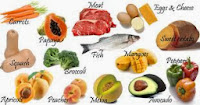 Vitamin C
Iron
Calcium
Vitamin K
 Vitamin D
Fluoride
Zinc
|
KIDS AND BREAKFAST
KIDS AND BREAKFAST
Do your kids eat breakfast?
Do your kids eat breakfast?
By many reports, 40% of kids don't.
But everyone knows that breakfast is the most important meal of the day, right?
Here is some proof:
- The State of Minnesota Breakfast Study showed that 'students who ate breakfasts before starting school had a general increase in math grades and reading scores, increased student attention, reduced nurse visits, and improved student behaviors'
- Children who eat a healthy breakfast 'meet their daily nutritional needs, keep their weight under control, have lower blood cholesterol levels, attend school more frequently, and make fewer trips to the school nurses office complaining of tummy aches.'*
- Kids 'who eat breakfast are more likely than children who skip breakfast to consume foods with adequate levels of minerals, such as calcium, phosphorus, magnesium, and vitamins, such as riboflavin, vitamins A, C, and B12, and folate.'*
Subscribe to:
Posts (Atom)
Social Icons
FOOD HEALTH
AFYA YA CHAKULA KWA MTOTO: |
| Maradhi yanayosababishwa na vyakula ambavyo havijatayarishwa vizuri yanapelekea idadi ya watu million 81 kupata maradhi kila mwaka, na takriban watu 9000 wanapoteza maisha kutokana na maradhi haya. Watoto wapo hatarini zaidi kupata maradhi kutokana na chakula kibovu. |
VITAMINS AND MINERALS
Vitamins and Minerals | ||
It is estimated that a daily multivitamin is given to 25-50% of children, although this is generally not necessary for most children with an average diet. Some children that have a poor or restricted diet, liver disease or other chronic medical problems, especially those that lead to fat malabsorption, such as cystic fibrosis, may need vitamin and mineral supplements to prevent deficiencies.Preterm infants and children who are exclusively breastfed may also need vitamin supplements.
Also, children may need fluoride supplements if they do not drink fluoridated water.
Although you may give your child an age appropriate multivitamin if you or your Pediatrician feels that your child needs one, it is probably better to try and reach his daily requirements or recommended daily allowance by providing him with a well balanced diet. Consuming a diet with the minimum number of servings suggested by the Food Guide Pyramid will provide your child with the recommended daily allowance of most vitamins and minerals.
Vitamin A
 Vitamin C
Iron
Calcium
Vitamin K
 Vitamin D
Fluoride
Zinc
|
KIDS AND BREAKFAST
KIDS AND BREAKFAST
Do your kids eat breakfast?
Do your kids eat breakfast?
By many reports, 40% of kids don't.
But everyone knows that breakfast is the most important meal of the day, right?
Here is some proof:
- The State of Minnesota Breakfast Study showed that 'students who ate breakfasts before starting school had a general increase in math grades and reading scores, increased student attention, reduced nurse visits, and improved student behaviors'
- Children who eat a healthy breakfast 'meet their daily nutritional needs, keep their weight under control, have lower blood cholesterol levels, attend school more frequently, and make fewer trips to the school nurses office complaining of tummy aches.'*
- Kids 'who eat breakfast are more likely than children who skip breakfast to consume foods with adequate levels of minerals, such as calcium, phosphorus, magnesium, and vitamins, such as riboflavin, vitamins A, C, and B12, and folate.'*
Subscribe to:
Posts (Atom)

.jpg)

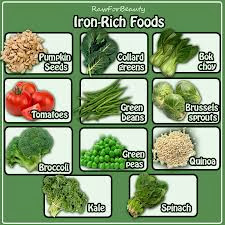.jpg)
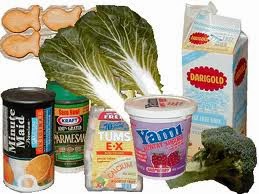.jpg)

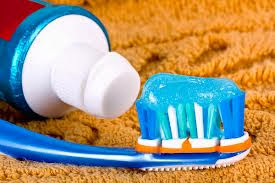.jpg)
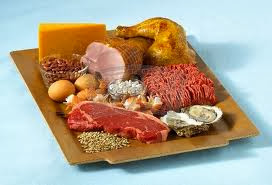.jpg)

